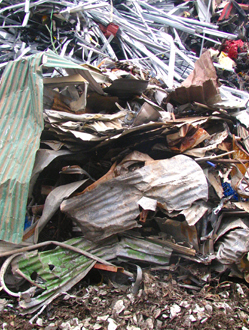Project leaders: Dr Nick Florin (ISF, UTS) & Prof Stuart White (ISF, UTS)
Project team: A/Prof Damien Giurco (ISF, UTS), Aleta Lederwasch (ISF, UTS), Melissa Jackson (ISF, UTS)
Program 4 aims to identify transition pathways that can be pursued to ensure that Australia can generate wealth from waste. To do this, it applies transitions and futures science. It also integrates the findings of Programs 1, 2 and 3 to explore the potential of Australia to be a leader in resource stewardship.
Specifically, Program 4 explores ‘what would it take’ to bring a high priority case study (identified from Program 1) to fruition. It also shows how a multi-layered interactive resource atlas (from Program 2) could be used as part of innovative decision-making processes to promote the uptake and economic benefits associated with recycling in Australia, and how innovations in business models (Program 3) could be used as a niche to drive the transition. Further, the research builds on the outcomes of a recent foresight research for CSIRO in the Mineral Futures Collaboration Cluster. The vision to come from this research was that ‘Mineral production makes a net positive contribution to a sustainable Australian economy’.
The science of transition pathways for innovation-led transformation is poorly characterized. Transition management research has been pioneered in the Netherlands (Rotmans et al 2001) as a model of environmental governance, which emphasizes the role of niche innovations in changing the broader socio-political landscape and socio-technical practices. To date, the research has been heavily theoretical; this Program will contribute to building its practical application.
Guiding research questions of this program include:
- What are the different transition pathways toward a closed-loop mineral processing and management system? What opportunities and challenges exist for realizing these?
- What would it take to realise an industrial ecology led future involving metal recycling? What can be done to mobilise enablers, and overcome constraints?
- What is the guiding vision, and strategy to achieve this, that will be adopted by stakeholders and revisited through processes of reflexive learning and governance? What would it take for stakeholders to action the strategy?
Program outcomes and outputs:
Potential outcomes from Program 4 include: improved public policy regarding industrial ecology; a pathway for delivering post-cluster impact across industry, community, policy and the research community; improved national and international profile of Australian research in industrial ecology and recycling; and national dialogue and action amongst stakeholders toward a resource efficient Australia. Outputs to achieve these outcomes include:
- A forsighting case study to develop potential transition pathways for a usefully representative urban system.
- Stakeholder engagement activities that explore ‘what it would take’ to deploy a transition to an industrial ecology-led future involving metal recycling under future scenarios; identify existing and future capability for taking part in a local recycling system; and test the viability, benefits and impacts of different transition pathways.
- A report on determinants, conditions and parameters, which are most likely to support a significantly increased capacity for local recycling in Australia. This will involve collating and analysing the research produced by all cluster partners to make recommendations regarding actions, initiatives, data, skills, and circumstances that can be expected to increase Australia’s capability to recycle locally as part of a resource efficient global economy.
- Policy briefs for transitioning to local recycling systems for case study metals.
Dr Nick Florin: 02 9514 4797 Nick.Florin@uts.edu.au
Prof Stuart White: 02 9514 4944 Stuart.White@uts.edu.au



